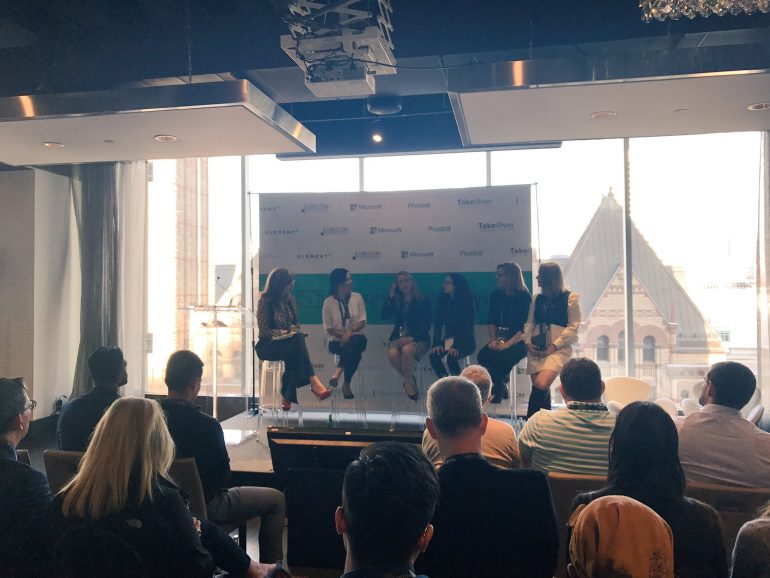This week, TribalScale welcomed the global startup community to its first-ever TakeOver conference, which explored how technology is impacting every industry from a Canadian context.
The day was split into three tracks: industry innovation, which spanned from retail, to transportation, to VR; human innovation, which included talks on gender equity, AI, and healthcare; and economic innovation, which explored trends in VC and blockchain. The day also fulfilled its commitment to develop a stage with equal representation of men and women, with 52 percent of speakers being women.
While the tracks provided some focus on the issues covered, the topics would inevitably intersect, including the reality of the VC industry’s lack of representation, and how AI will impact civilization.
“There is a reality that there really aren’t a lot of women investors, and that was a huge motivation for wanting to help, as I think we do need to have more diversity when it comes to writing cheques,” Candice Faktor, founder of micro-fund Faktory Ventures, said during the VC panel. “I also wanted to create a new model in a way that felt right for me. What I’m noticing is that I’m getting a great response from companies because I bring a different energy and different perspective.”
All three tracks at #TOIC17 are packed with the smartest folks in the city.
If you're not here, that's some serious #FOMO you'll have. pic.twitter.com/KdlLnw3Jed
— Tahsim Ahmed (@tahsimdotcom) October 2, 2017
Faktor was one of many on the stage to touch on the opportunities that we have to lead. During the blockchain panel, many speakers highlighted Canada’s opportunity to lead in the still-nascent space.
“Based on our population, Canadians are overrepresented in the blockchain space. The blockchain space, when you look from an outsider’s perspective, can be really difficult to wrap your arms around because it’s so quickly evolving and there’s all these factions that don’t necessarily communicate with each other; they all have different agendas they’re pursuing,” said Iliana Oris Valiente, founder of the ColliderX applied blockchain R&D hub. “The easiest way to look at distribution of where we see activities in the blockchain space starts with on the ground developers, where Toronto is home to many technical folks with experience.”
Hilary Carter, director of faculty at the Blockchain Research Institute, added that Canada’s diversity means that we can approach issues in the industry in a unique way. “We have a diverse population in Canada, specifically in Toronto. One of every two people living in the city was born outside of Canada,” said Carter. “Because of that, Torontonians have a real opportunity to collaborate because we’re used to diversity, it makes us better. Culture and people’s differences are not walls, they’re the norm here.”
Illuminating panel on #AI, hype vs. reality at the #takeoverconference in Toronto pic.twitter.com/NtPHZIKGHs
— McGill Dobson Centre (@DobsonCentre) October 2, 2017
One area that Canada already has a reputation for leading is in AI. As global tech companies set roots in Canada to take advantage of talent — and the Canadian government and AI leaders work to set the foundations for a strong AI ecosystem — many in the Canadian tech community are vocal in their confidence that Canada is a global leader in this space.
With leadership, however, comes responsibility, according to the AI panel. Many of the datasets that we use to build AI are trained on past datasets that may have traces of social biases from these eras. Integrate.AI VP of product and strategy Kathryn Hume says this actually makes AI, which seems futuristic, a very conservative technology.
“If we take socially sensitive use cases like using machine learning to decide if someone gets a job or a loan or a mortage, this will be trained on past data that can incorporate biases,” said Hume. “If we say we want great candidates, let’s look at past successful candidates. From the past, if you tend to hire white males, the system could do a great job of finding white dudes.”
Nicolas Chapados, co-founder of Element AI, added that AI creators must take into account ‘algorithmic fairness’, and envisioned a world where neutral third parties will check a company’s data to see that they’re not cooking up data, in the same way auditors check a company’s financial books.
“One question we need to ask ourselves as a community is what kinds of mechanisms we need to put in place to make sure all that this great technology is actually being used when models are put in production that impact the lives of people.”
Photo via Twitter


